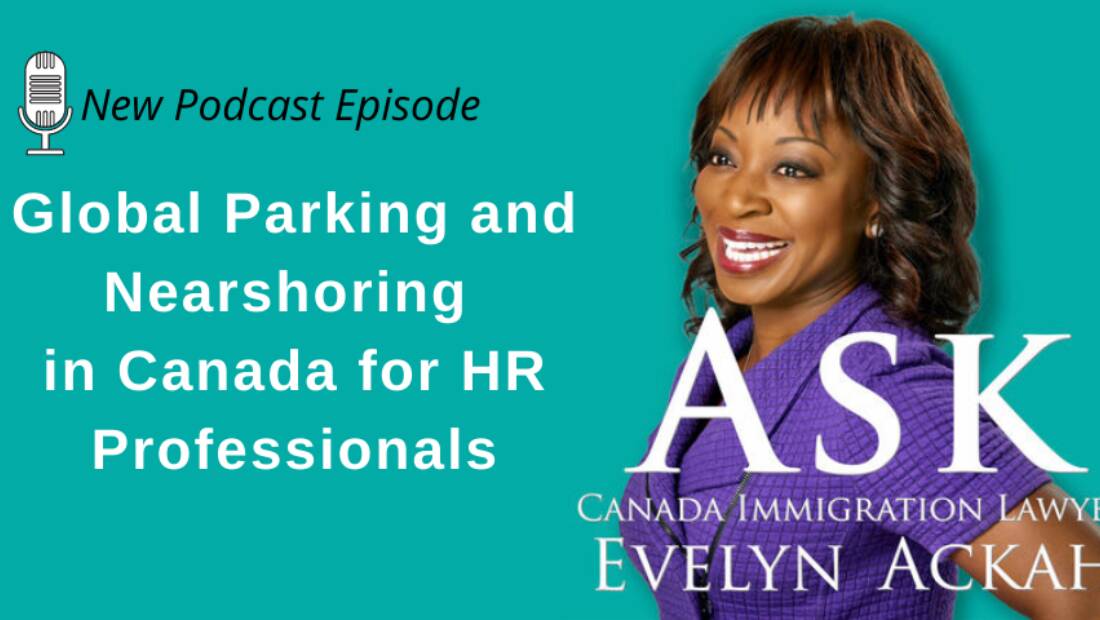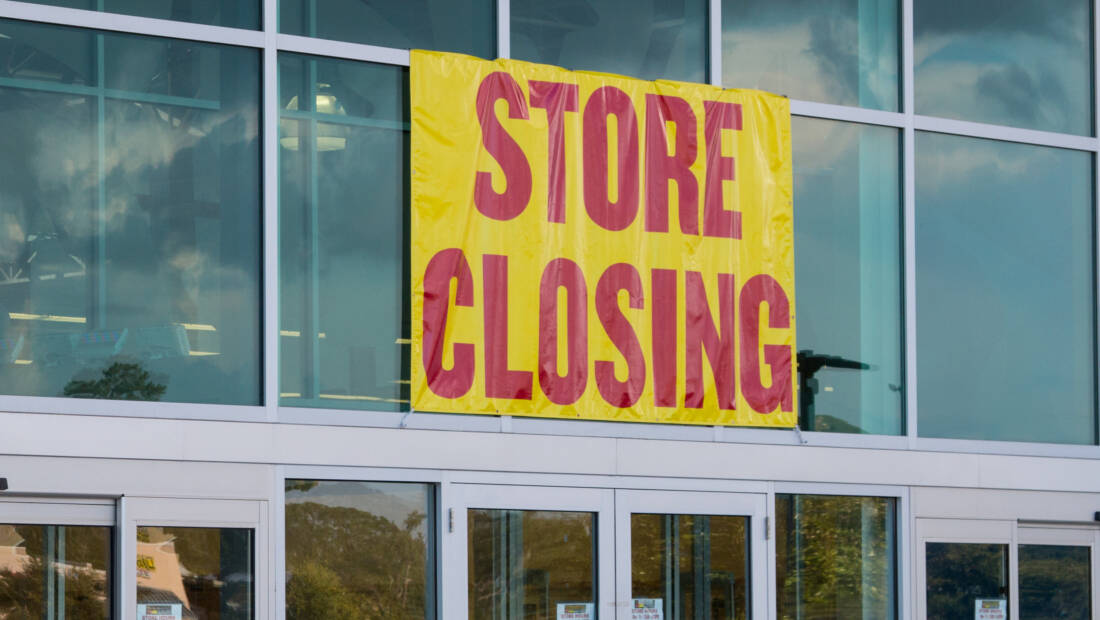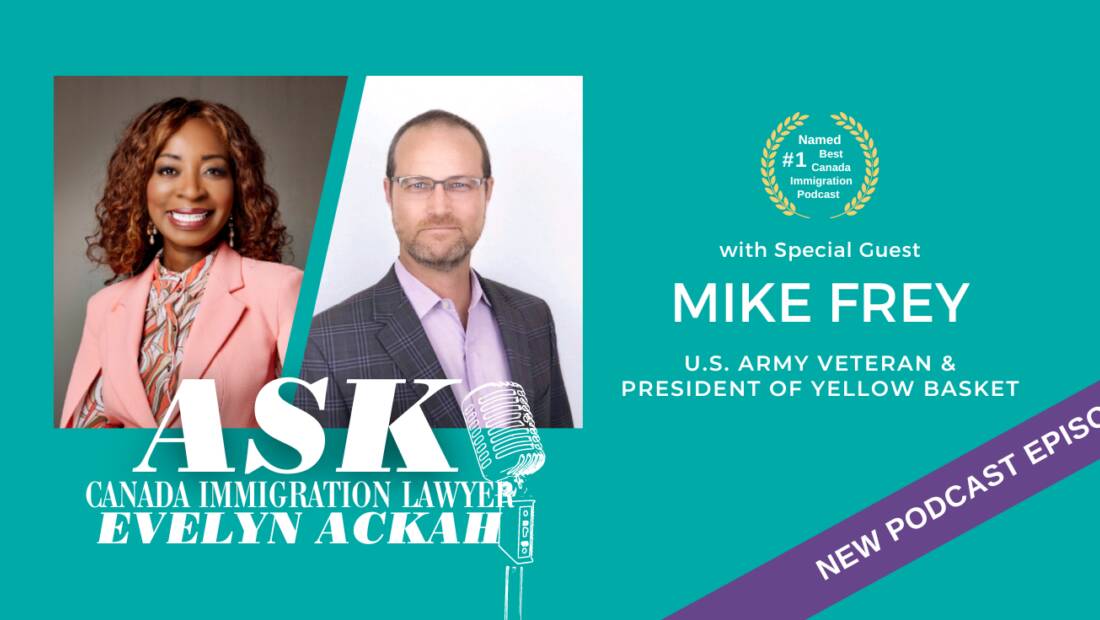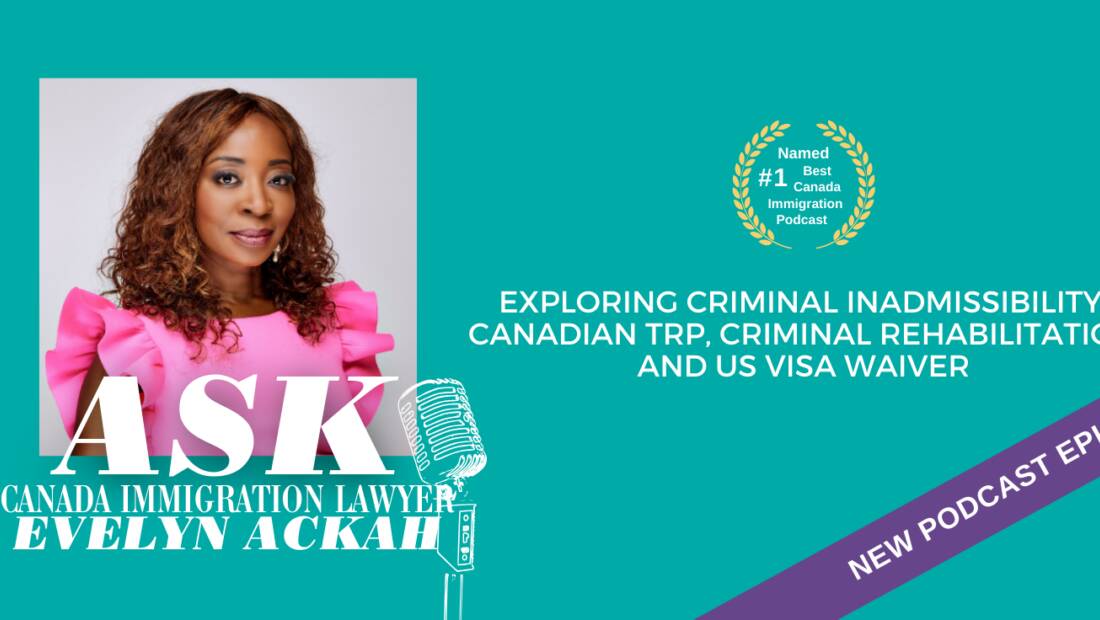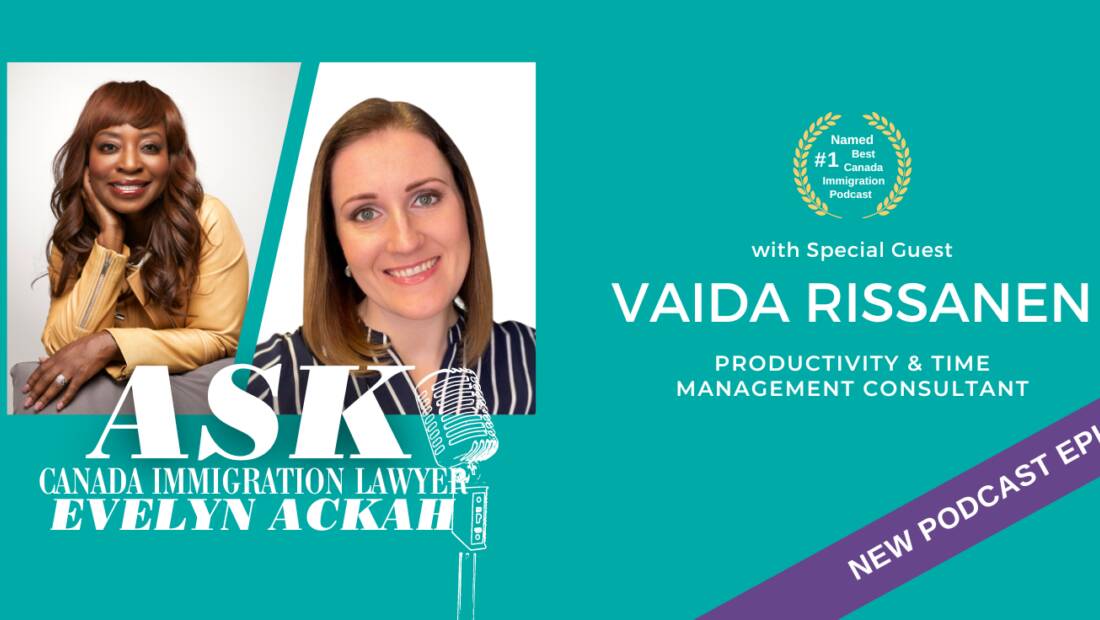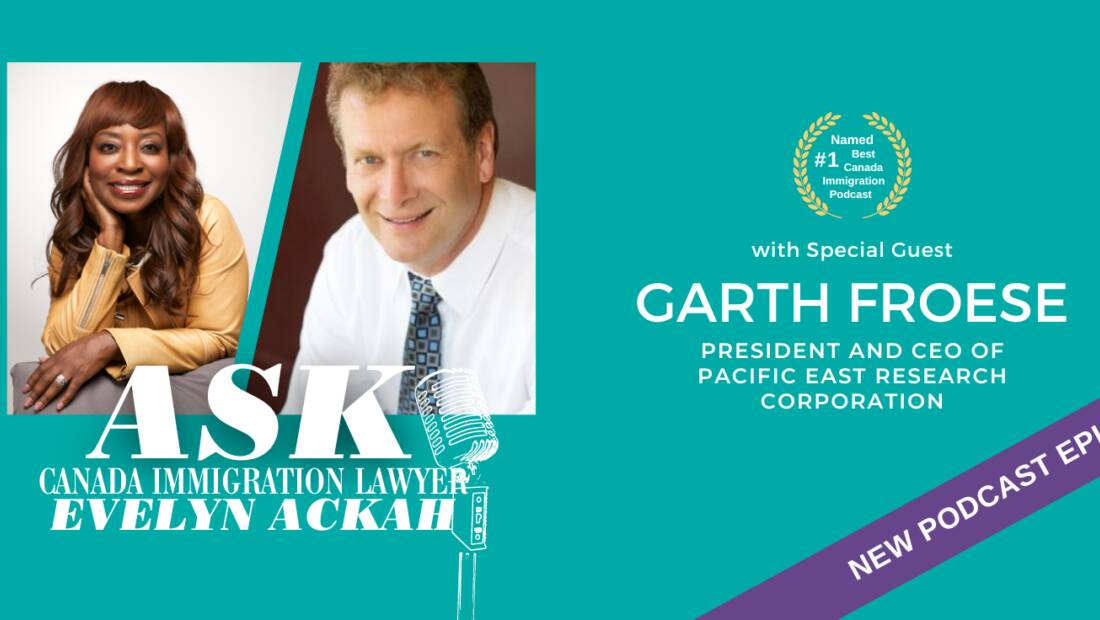Or listen on your favourite podcast app
Global HR Series
Calgary immigration lawyer and U.S. NAFTA lawyer Evelyn Ackah discusses what American and Canadian employers and foreign workers need to know about visas, global parking and nearshoring in Canada, including:
- What is global parking?
- What is nearshoring?
- Why is Canada a good option for American companies to global park or nearshore employees who can't get a U.S. visa?
- Why global parking in Canada a good alternative for H-1B employers?
- What are the benefits of global parking?
- Why is Canada the best option for American companies to global park employees?
- Canada's immigration alternatives to global parking including:
- intra-company transfers
- permanent residence
- incorporating a related Canadian entity

About Evelyn Ackah
Evelyn Ackah is the Founder and Managing Lawyer at Ackah Business Immigration Law. We work with individuals and business owners from all over the world who want to cross borders seamlessly. For more information on immigration to Canada or the United States, Ask Evelyn Ackah at Ackah Business Immigration Law today at (403) 452‑9515 or email Evelyn directly at contact@ackahlaw.com.
Transcript
Evelyn Ackah:
Good day. This is Evelyn Ackah from Ackah Business Immigration Law. And also I am recording this for our podcast called Ask Canada Immigration Lawyer Evelyn Ackah so that I'll be able to share this information with everybody who may not be able to join us on the live webinar we're having today. Thank you so much for joining us. I am really honoured that people are interested in the issue of global parking and nearshoring, which is what we're going to be talking about today. I'll also be going between my presentation as well as slides so that you can see what the plan is for our presentation today. And hopefully there'll be opportunities for questions at the end. And if not, you can always contact us at Ackah Business Immigration Law, (403)452-9515.
Evelyn Ackah:
So I'm going to start screen sharing now, and we will get started focusing on the immigration information we're focused on today. So what I want to talk about is about the issue of what is considered nearshoring and global parking and how it can impact you as a U.S. employer looking north, why it is that you may want to bring some of your employees from the U.S. into Canada. Again, my name is Evelyn Ackah. I'm the founder and managing lawyer of Ackah Business Immigration Law. This is our presentation today, Global Parking and Nearshoring: Why U.S. Employers Should Look North to Canada.
Evelyn Ackah:
I'd like to share what the plan is in terms of the presentation overview with you. Today, we will be doing an introduction to Ackah Law. We'll be setting the stage and providing a background as to what the concept of global parking and nearshoring is. And then getting into more detail as to what global parking and nearshoring is. I'll be talking about the impacts and the opportunities with the U.S. and Canadian immigration law so you can understand exactly what is referred to when we talk about global parking and nearshoring. And we're going to talk about some of the benefits of having this opportunity to bring employees to Canada or other countries from the United States. I have some interesting case studies to share with you, because we've been dealing with this for several years now and want to also let you know how it is that we can assist you. So that's what we're going to be focusing on today.
Evelyn Ackah:
To give you a little bit of information about Ackah Business Immigration Law, we have been a firm for 12 years. We're based in Calgary, Alberta, and we have virtual locations in Vancouver and Toronto. The focus of our work is on personal and corporate immigration law. That is what we do. We help people with their businesses move to Canada and incorporate and transfer. And we also help families and businesses in Canada bring and identify the ideal candidates that they want to bring to Canada. So that's a little bit about us. We have a fabulous team of lawyers, paralegals, and immigration consultants as well, who all work with us to help our clients to provide them with the best possible work that we can and to do our very best because we are very passionate about immigration law. All of us have an immigration story. We all are immigrants at some point or other. And coming to Canada, we all remember and understand the process and we know how challenging it can be. So our job is to help support you through that process.
Evelyn Ackah:
Now let's get started. I want to talk to you about setting the stage and a little bit of background in terms of what we mean when we are talking about global parking and nearshoring. But first, we need to go back and we need to talk about why this issue came to be. It's very recently, I would say... oh, let me go back... I think it's really in the last maybe five to seven years this has become a real strategy for especially U.S. immigration. And the way it works is because there is such a significant backlog with U.S. immigration for H-1B visa holders and other highly skilled workers in the States. And also during COVID, the timing and the process has been extended significantly. It is taking much, much longer to bring people in that companies want, which is definitely leading to delays and economic impact.
Evelyn Ackah:
COVID itself has also impacted the processing times. And what is occurring now is that people who were in the process, let's say, for a Green Card, are now struggling because they're no longer able to get the Green Card status in a timely manner. So this is why the issue of how and where to move your skilled workers to has become a priority for some U.S. companies. And even companies from Mexico, India, other places, are looking into this strategy.
Evelyn Ackah:
For those of you who don't know, the H-1B is a category of immigration that is a U.S. immigration category for highly skilled workers. And what that means is that they can bring people into the U.S. as engineers, as people with master's degrees, PhDs, highly skilled backgrounds, but it's based on a lottery. So there's never a guarantee that the employer who has offered you the position is going to be able to bring you in in the timeframe that they want. If you don't get the lottery win, then you're not going to be unfortunately able to be successful. And so that is why companies have been looking at other strategies if they can't get into the H-1B lottery and be successful, what to do so they can keep the employees that they want to bring to Canada.
Evelyn Ackah:
So what are the challenges that we've been seeing is that because of the extensive delays, people have looked for more innovative business practices, how to go around, let's say, the H-1B process so that they can keep the skilled workers they have who either are waiting for extensions on their H-1Bs or they're waiting on their L-1s or they were refused L-1, which is the intra-company transfer, and how to keep them in the same time zone or on the continent, at least, where they can help continue to provide services for the company that they need.
Evelyn Ackah:
Another factor of the background here is that with COVID, the Green Card process has been extended significantly, especially for citizens of certain countries. Unfortunately, for some citizens, let's say, of India, it can be 10 years or more waiting on the Green Card process. And so in that time, they're always having to deal with their temporary status, their H-1B status or L-1B status. And it's very stressful when you have families and employees who are dealing with the situation who can wait 10 years to get a Green Card. So as a result, many employees have also brought to their employers the option of Canada. Can we come to Canada where we know we might be able to get permanent residence within two years?
Evelyn Ackah:
So this has led to the issue of global parking. Global parking is a solution and strategy that is utilized by employers to park their talented employees in a nearshore affiliate country for a short-term assignment until the U.S. visa process can be completed. This is something that companies have been doing in order to keep their talent.
Evelyn Ackah:
So some of the benefits of this process is that it provides employers with additional time until the visa that they want in the U.S. is secured. It allows them to retain top talent. And oftentimes this is top talent they have brought to the United States. They want to keep them. They want to ensure that they have consistent operations that are not impacted by the lack of skilled employees. Often, moving to Canada means that there's a similar culture and a language and their foreign workers in the U.S. are already used to. So it makes the transition for them much easier and much smoother. Of course, if you're in the U.S. as a business owner, you have a favourable exchange rate coming to Canada versus some other countries because they get more value for their buck.
Evelyn Ackah:
And one of the big ones we hear from companies is because of the geographic proximity and time zones. It makes a big difference. So they can keep working with their team, even if they're working from another country. So oftentimes people in Silicon Valley, they will move their employees to Canada and work in BC, British Columbia, or Vancouver, let's say. Or if they're on the East Coast, they'll move them to Toronto so that they maintain that they're still in the same time zone while they are continuing to work from another country while they're also getting their status in another country. These are some of the considerations of the global parking phenomenon.
Evelyn Ackah:
Another issue we're going to talk about today is nearshoring. And this is sometimes also called nearsourcing. It's where a business moves its operations to a nearby country from one of greater distance. So for instance, nearshoring is a term that came out of the practice of offshoring, which is when companies move their product manufactured to a lower-cost region than that of their native country. So nearshoring can be a case of, let's say, an American company moving operations to Mexico. It's close. And it also is a lower-cost region. So that's one of the examples. But they can also move them to Canada. Because of the dollar difference between the Canadian and U.S. dollar, it will still be lower-cost region for them to bring some of their operations into Canada under the nearshoring strategy, because they're going to be saving money, paying employees in Canada a lower salary based on the U.S. Canadian dollar.
Evelyn Ackah:
If a company decides to nearshore, it provides employers with flexibility. They get to maintain corporate culture because they're either on the same continent. So there's certain things that they can continue. They can attract and retain best talent. So if they're in Canada, for instance, they can attract great talent. And the same with Mexico, if they end up moving operations there. At least for Canada, and even Mexico to a certain extent, there's a similar culture and language and also favourable exchange rate. So these are the factors that impact why a company would want to nearshore or nearsource their business operations to a nearby country.
Evelyn Ackah:
So we're going to talk a little bit now about how nearshoring and global parking are impacted by U.S. and Canadian law. Employees in the U.S. can park their highly skilled employees in Canada until they can qualify for the U.S. visa category that they're looking for, such as an intra-company transfer, the L-1 visa or the H-1B visa, which is the lottery visa. If they can get it secured, then they can bring the person that they've brought to Canada into the United States. And then they're able to continue working for the same company. They don't lose that great talent that they've already hired. If the U.S. employer has a parent company, a branch office, subsidiary, or affiliate company in Canada, the applicant may qualify for a Canadian work permit for the necessary period of time needed. So this really allows people and companies to have some flexibility as to how to bring people to Canada.
Evelyn Ackah:
So I just want to talk about the law as it relates to intra-company transfer. The way that you're able to bring somebody, let's say, who's in the United States on an H-1B that's expiring is they've worked for the U.S. company for at least 12 months, you're able to bring them to Canada because they're able to transfer to the Canadian entity. And many companies, if they don't have a Canadian entity yet, they're able to move them into Canada by way of establishing a Canadian entity first. So we help at Ackah Law with incorporating your company so that you can move that company to Canada and move that employee. And in Canada, our category is just called the intra-company transfer. It's either a specialized knowledge category, or it's a managerial category, executive category. And it allows that employee that may be from India or China or Nigeria or wherever to be able to transfer and get a work permit and visa to move to Canada and work because of their one year or more experience with the U.S. entity.
Evelyn Ackah:
I'll talk about some of the case studies shortly, but the other option for this category is the L-1B. So let's say that somebody is an L-1B, which is the specialized knowledge worker category. They can also move to Canada under that category and they can get up to three years initially on a work permit that is then renewable up to five years for those that are intra-company specialized knowledge workers, and up to seven years for those that are executive managerial. Obviously the intention behind the global nearshoring and the parking is that you don't want to have them be in the country that long. But literally, if they're in Canada for two, three years, they could become permanent residents of Canada and then choose to move back to the United States. So these are all interesting concepts for you to think about.
Evelyn Ackah:
So in terms of our next slide, what are the benefits of parking employees in Canada? I mean, there's so many, and as I said, we've been seeing a significant rise in this strategy. There are more options for alternative work visa and permanent resident streams in Canada. In Canada, becoming a permanent resident can be done after 12 months of full-time employment for a Canadian entity, and then might take in total two to two and a half years and you can become a permanent resident. Whereas the United States, it's a 10-year process for some people. And some people may not even have the option at all, which is really frustrating and discouraging when you've been working and contributing to the U.S. economy and the business in the U.S. to not have the option to become a permanent resident. Canada allows that, subject to getting into Canada successfully.
Evelyn Ackah:
The other option or the benefit of parking employees in Canada is it allows you to keep that great talent and keep operations moving smoothly. There's not a disconnect or a disruption in the operations of the company. For instance, if somebody had to be sent back to their home country, if they were back in India, or Pakistan, or Nigeria, or the UK, Australia, wherever they came from, if we had to send them back because they did not have any more status to work in the U.S., it would be very disruptive to the organization. Again, I've already mentioned, there's a location and linguistic proximity. So the fact that everybody's speaking English, it makes business easier to do. And the time zones and culture are all real important aspects to consider when you're looking to do a parking or a nearshoring of one of your employees.
Evelyn Ackah:
I wanted to talk about some case studies so that I can make this more tangible to all of you that are going to be listening to this and participating in the webinar and the podcast. So one of the examples I have is a Silicon Valley software engineer. They started, I would say, this whole concept of nearshoring, because it was out of the need of H-1B workers in the U.S, a number of software engineers, high tech employees that had come from other countries on H-1Bs. And they were having struggles with either getting renewals of the H-1Bs, or they weren't moving fast enough to the Green Card process. And so companies started reaching out to say, "We actually have a Canadian operation. Why don't we go and park them in Canada for a year or two while we sort out this H-1B situation."
Evelyn Ackah:
And so we've been helping clients with this for a number of years where they bring their employees to Canada and they continue working, continuing the same job. They just have relocated themselves and their family to Canada. It's becoming a very common strategy. And the goal is sometimes to come into Canada if you're running out of time, while you're waiting on an extension. It could be just for three months or four months. Or it could be you've capped out and you don't have any more time under your visa and you're not yet a Green Card holder, so let's take you to Canada and park you there, leave you for two or three years. And hopefully when your Green Card is approved, you can come back to Canada. And as I said before, in that time, people are almost always able to obtain as well Canadian permanent resident status, which is a really great thing for them to have the option.
Evelyn Ackah:
Another one of the case studies I want to talk about is about a student that was on OPT after their U.S. education. So for those who don't know what that means, OPT is the category of being able to work in your field that you studied after you finished university in the U.S. and this is usually for a year to 18 months. So we have a client who has hired a wonderful student while they were in school and then has offered them OPT. And they worked for a year. But they did not have success in the first effort to reach the H-1B visa for that employee. And so, unfortunately, the OPT's running out and they still want to keep the employee rather than send him all the way back to where he came from. I believe this one is from Cambodia.
Evelyn Ackah:
And so we are working on, what we had to do was incorporate a related Canadian entity for them. And they chose to incorporate in British Columbia, which is often the case because it's one of the few provinces until very recently that you could incorporate without needing a Canadian director. And then we're going to be transferring that employee to Canada, likely to work in Vancouver, so they can stay on the same time zone as their employer while they try again for the H-1B for another year. The lottery will be happening next February. And they hope they'll get in that time. And they'll be able to bring the employee back to the United States. And so this is a case where the person had that one year. So they're able to come to Canada under what's called the Intra Company Transfer category. So that's something that's also regularly done.
Evelyn Ackah:
Another option is the startup company, the executive that did not get the Green Card in the U.S. and had to return to New Zealand. And yet they're the president of the company. So they reached out to us after the president had to leave the U.S. while waiting on the Green Card processing to say, "What can we do?" And so again, we have incorporated a related entity and we are going to be transferring that executive to Canada so she can continue working as president of the company that's based in the U.S. from a time zone that is more in line with the rest of the business. So this is really what we do and what we can assist companies with is how best to bring people to Canada.
Evelyn Ackah:
But what about the case of an employee that has not been with the U.S. entity for at least one year, which would've then allowed for that Intra Company Transfer? For cases like this, we, in Canada, have options under what's called the Labor Market Impact Assessment. LMIA. And this category is what happens when the Canadian end of that company would sponsor the foreign worker from the U.S. under labor market process to say, "We can't find anybody with this experience and background in Canada. We want this person here and we need to bring them. And so we'd like to get the LMIA. And even though they've only been at the company for six months, we see the value they're bringing and let's get the work permit." So that's another one of the categories in Canada that is permissible for people who don't have 12 months of experience with the U.S. entity. They can still come to Canada and be nearshored or globally parked once they get the LMIA confirmation approval and a work permit to work in Canada.
Evelyn Ackah:
I'm just going to go through these case studies and then we'll get back to the slides. But one of the other situations, though, is an H-1B professional from Pakistan, I believe, that had been refused the H-1B for whatever reason. And sometimes you just don't get the approval. They thought maybe the person didn't have the skillset that they needed. But this person was working for the company that's based in the U.S. from their home country, from Pakistan. So we were able to say they already had 12 months or more experience with the related entity in their home country. And so why not bring them to Canada. If we can't get them into the U.S., why not bring them to Canada instead? And so that's what they did.
Evelyn Ackah:
They already had a Canadian entity as well. So we then did the transfer from Pakistan to Canada. And then the benefit of that is they're able to be in Canada for 12 months. They're on the continent. And the company's able to try again to get the work permit for the U.S. H-1B. Or now they have the option of an L-1A or L-1B from Canada to the U.S. So that's one of the challenges that we can overcome and help you with when it comes to this issue of nearshoring and global parking.
Evelyn Ackah:
So I'm going to get back to our slides. Here we go. So one of the things we want to talk about is how can we assist companies and organizations to bring their people to Canada? What exactly do we do at Ackah Law so that you understand when might be the right time to reach out to us? We have a number of corporate files right now where we're helping people. We do the following at Ackah Law. We can incorporate a related entity for you, whether it's a branch, subsidiary. We can do the incorporations federally, provincially and help you set up the company so that you have a company for your employee to come to work for. Because in Canada, you need to have a Canadian company that is basically the sponsor. And there is something called the Employer Compliance Portal, which is what the Canadian company has to complete to be able to also help bring this person to Canada.
Evelyn Ackah:
So at Ackah Law, we offer legal expertise in Canadian and cross-border U.S. immigration law to help you meet your global parking and nearshoring needs. You reach out to us when you're at the point where you're thinking, "Oh my God, we only have two months left on this visa and we're not going to get it in time." What do we do so we can help make this work? We provide full-service support to get work permits in Canada, as we've mentioned before. And we also have U.S. attorneys on our staff as council who can help provide an even longer-term strategy.
Evelyn Ackah:
So it's not just the work permit for the worker and also the family that's accompanying, if they are. We can also help the spouse that's coming get an open spousal work permit. Kids can go to school. We can help with the Canadian permanent residence as well. While they're in Canada, you might as well, in my mind, qualify yourself for permanent residence. So that way, you have options. If it never happens in the U.S., you always know you have the Canadian permanent residence status, so long as you've met the residency requirement.
Evelyn Ackah:
Next. So how can Ackah Law assist you further? Just to give you an overview, we provide flat-rate pricing, 24/7/365 global support for our clients when they're travelling, proactive legal solutions, integrity, commitment, and more than 60 years of combined experience in immigration law. So this is really all we do, and we love what we do. This is some more information about what we provide. Temporary status assistance. Work permits, TNs, which is U.S.-based TNs for Canadians, L-1s, H-1Bs, E visas, study permits, visitor visas, Labor Market Impact Assessments, intra-company transfers, NAFTA Professionals, work permits for Mexicans and Americans coming to Canada. We help with the General Agreement of Trade and Services for Europeans coming to Canada, spousal work permits, criminal or inadmissibility rehabilitation, restoration of status, NAFTA work permits. We also help with the permanent status for express entry permanent residence, live-in caregiver programs, provincial nominee programs, citizenship, Green Card, and U.S. citizenship.
Evelyn Ackah:
So those are the things that we provide here at Ackah Business Immigration Law. I'm hoping that this information that I shared with you today has been useful. For those that are corporate clients of ours and corporate people that are considering what to do if they're stuck, you need to know that you do have options. And it's important to reach out with as much time as possible so that you can talk to us or another lawyer to make sure that you can put in place all the things you need so that you can have a successful nearshoring or global parking experience. And we can assist as well, because one of the aspects of helping when it's a new company is even how to set up things like benefits, payroll, taxes. Ackah Law can help you with that.
Evelyn Ackah:
There are some companies we work with that are partners that help us with, it's called professional employer organizations. They can help you with benefits and employee setup, payroll, taxes. All of that can be done so that if you don't have the infrastructure or you don't have a team yet in Canada, you don't need to worry. Because, of course, the U.S. laws and Canadian laws of employment are very different. And so you will be supported here if you need any further assistance.
Evelyn Ackah:
I'd like to thank you so much for participating and joining me on this webinar, as well as the Ask Canada Immigration Lawyer Evelyn Ackah Podcast. If you have any questions at all, you know that you can contact us through our website, ackahlaw.com, or through our phone. Give us a call, (403) 452-9515.
Thank you so much for your time today. Have a great day. And we look forward to helping you cross borders seamlessly.
Take care. Bye-bye.

